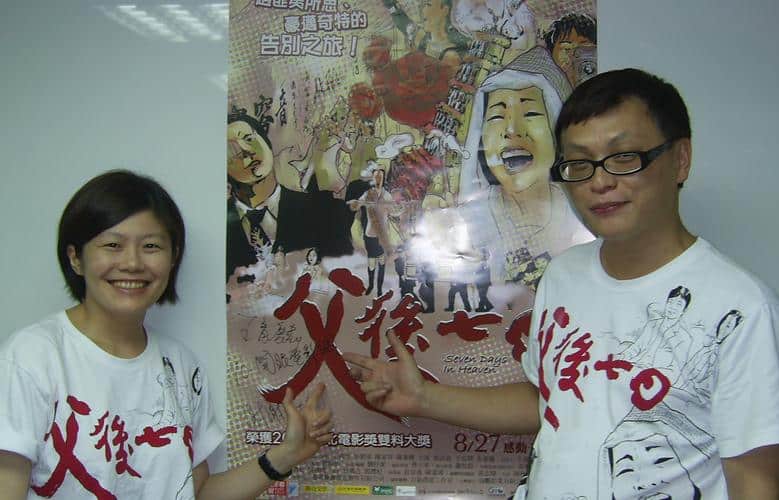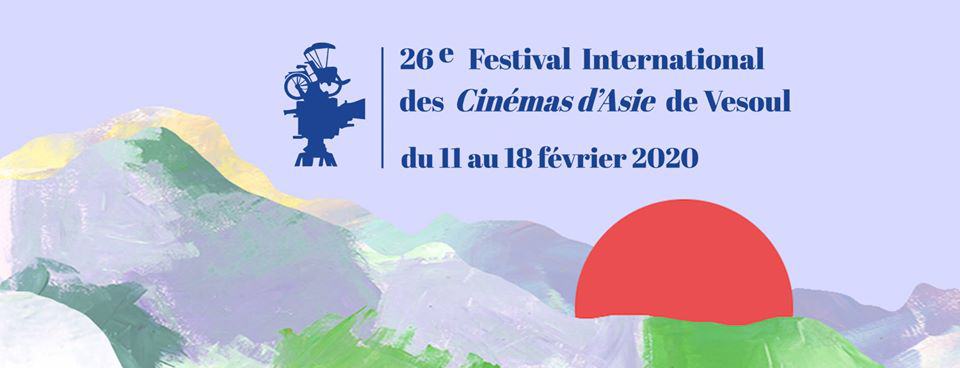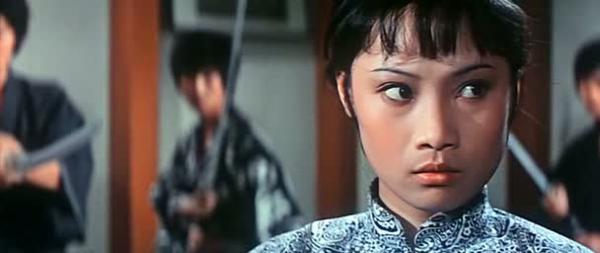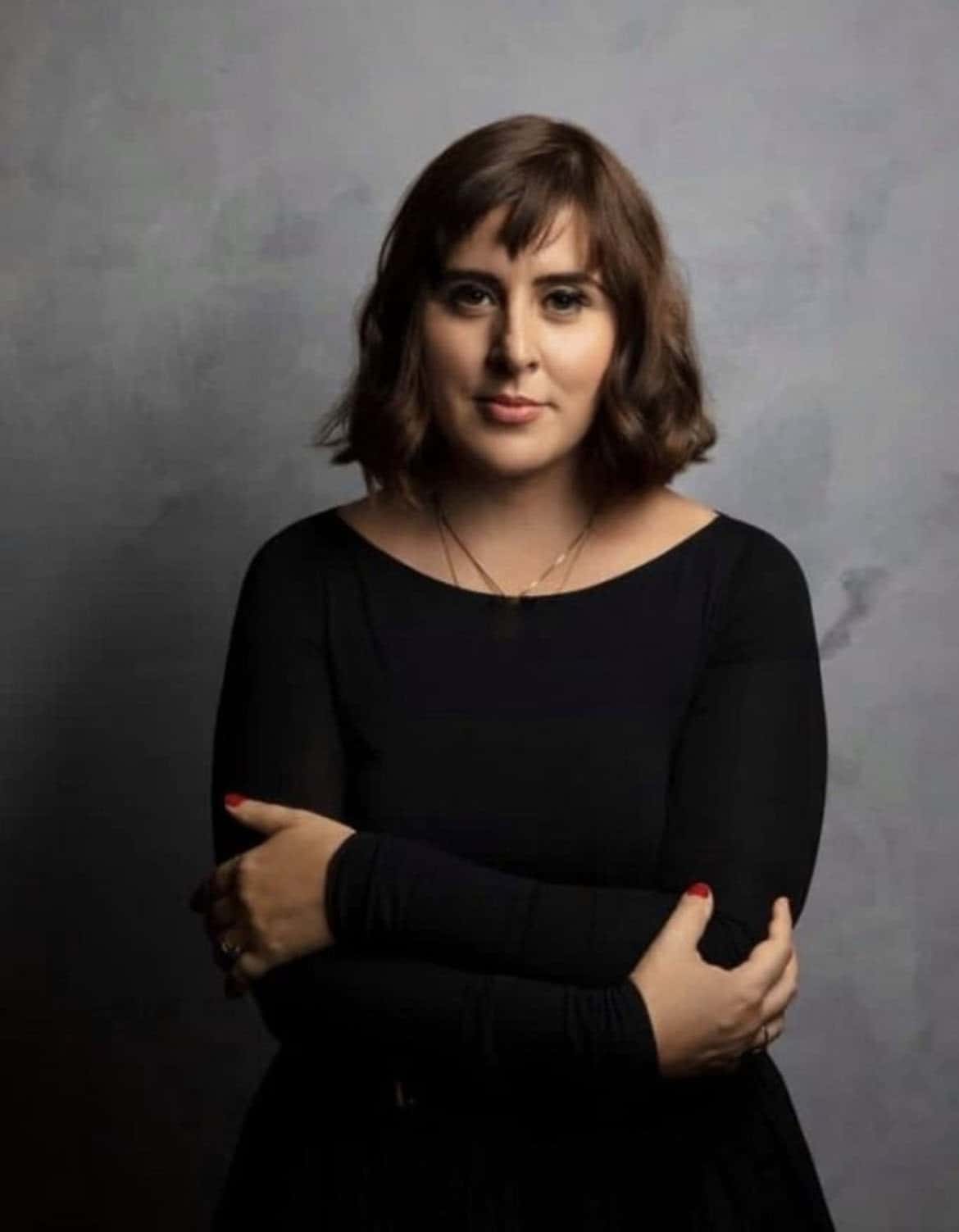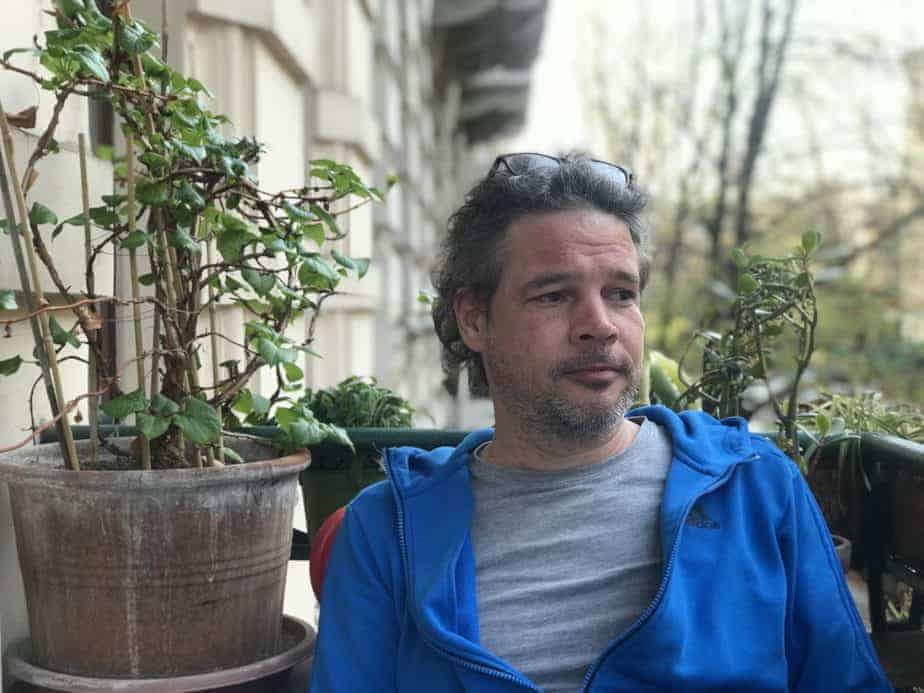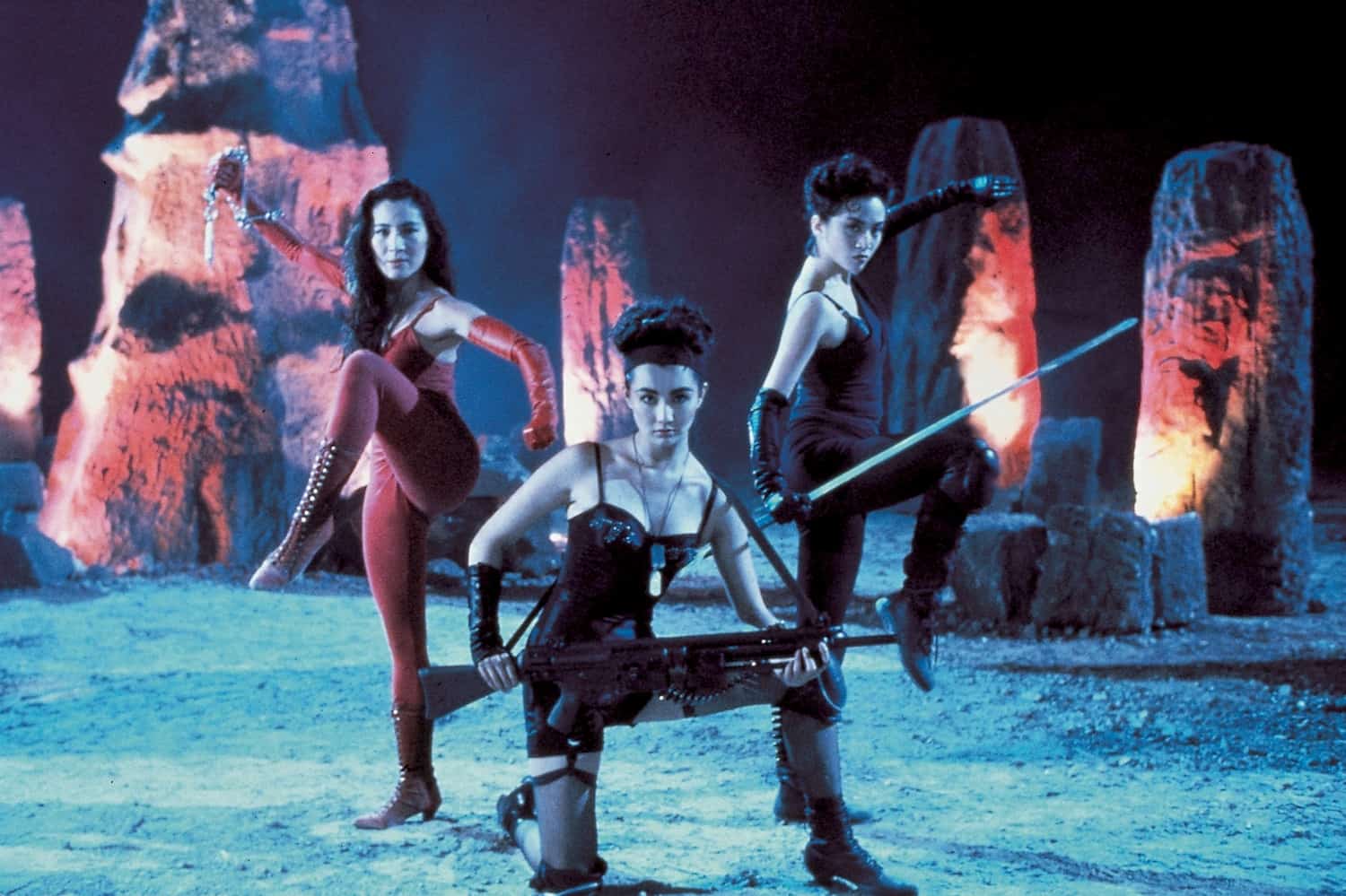Wang Yu-lin, born in 1964, is a Taiwanese director and producer whose career tackles different movie genres, from comedy to documentaries, and more to come. After graduating from the Department of Forestry and Resource Conservation at National Taiwan University, he moved to the US to study film at the School of Visual Arts in New York City. He then founded Magnifique Creative Media Production Co., Ltd., where he became editor, director and producer of all his movies. His “Alifu the Prince/ss (2017)” was nominated for the 54th Golden Horse Awards' Best Original Screenplay award. Instead, his most recent work “In the Morning of La Petite Morte (2022)” was selected for the 2022 edition's Tallinn Black Night Film Festival Critics' Picks competition. Not to mention “Seven Days in Heaven (2010)”, his co-directing project with writer Liu Essay, the main focus of the interview.
Born in Taipei in 1980, Liu Essay is a nationally acclaimed writer and a university teacher. She won a Lin Rong-San Literary Award for her essay “Seven Days of Mourning”, a deeply personal reflection on her father's passing. The essay was then adapted into a movie, “Seven Days in Heaven” (2010), the aforementioned co-directed project. Liu and Wang's comedy received multiple nominations at the 47th Golden Horse Awards, where late actor Wu Peng-feng won Best Supporting Actor for his amazing performance. Today, she still writes non-stop both in literary form and for TV and film scripts, such as All Because of Love (2017).
On the occasion of its screening at Asian Pop Up Cinema 2023, we talked with directors Wang Yu-lin and Liu Essay about the behind-the-scenes of “Seven Days in Heaven”, Taiwanese society, family and cinema.
“Seven Days in Heaven” is screening at Asian Pop Up Cinema
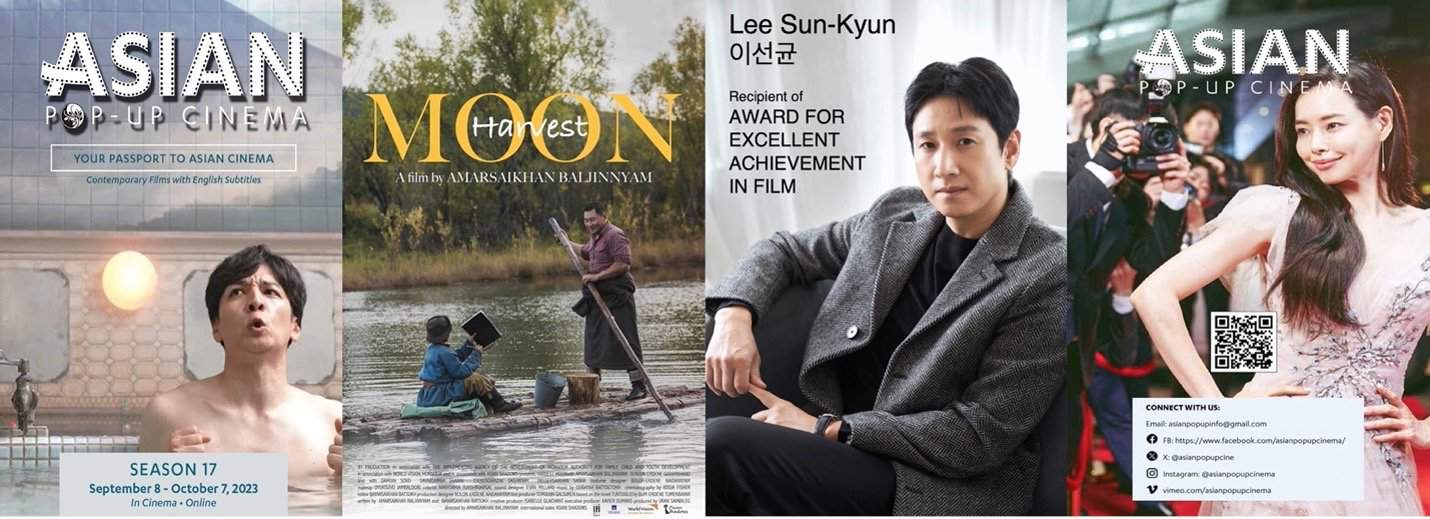
(Liu Essay) The movie is based on your award-winning story. Why did you decide to transform your words into a film? And how did the story development work out when writing the adaptation?
After my essay won the prize, Director Wang Yu-lin invited me to adapt it into a movie script. Probably thanks to my job as a reporter at the time or my creative outlook, I was able to objectively detach myself instead of insisting the essay is my personal experience. I wanted it to grow into a more universal story, so everyone could see their own life. Therefore, the protagonist, the father, and the family were re-“fictionalized”. The backbone and arc of the original prose were retained. As for the film, we opened with funny absurdities and concluded with calm sadness. Key players in the area like the Taoist priest and professional mourners along with some scenic locations were also added. The visuals, the dialect, and the sounds enriched and deepened the story together.
At one point, Mei tells the audience: “No matter where you come from, you are bound to reunite at the same places.” It expresses one of the main messages of the story, as it focuses on one's indestructible relationship with family. Would you like to talk about it?
Losing a loved one is painful, but looking at it from afar, we all die eventually and may reunite in another world. Rather than “family”, what I want to bring more attention to is the essence and origin of a spirit. Death is not the end, but another starting point. I gained this inspiration from conversations with undertakers during the field research stage of scriptwriting. They oversee the processing of countless dead bodies every day and accompany numerous bereaved families. For them, death is a part of daily life, and in the end, everyone must return to “the same place”, whether it is heaven or Sukhavati.
“Seven Days in Heaven” portrays a story where, through religious rituals, the son and daughter are obliged “to perform grieving”, causing little space for them to grieve at their own pace. It dwells a lot on societal and traditional expectations and reality. What are your thoughts on the subject?
When I was in my twenties, I was full of anger and disdain, and my emotions were expressed through literature and movies in a dumbfounding way, because young people had no choice but to do as instructed. But now, more than ten years have passed, and I will carefully consider the necessity of these rituals. In fact, the intention behind the activities is to reunite relatives so no one mourns alone, I don't completely negate it.
Check also this article
As we just said, the film is an original tale of how contemporary society views family, tradition and religion. Since “Seven Days in Heaven” comes from personal experience, do you think something changed since the film and the story were released?
Over the past ten years, these traditional rituals have become more and more simplified in Taiwan. Even in the countryside, people only perform the basics nowadays. It feels much more lonely. I don't think this is necessarily an advancement, but rather that traditional customs are fading out. Now I am gratified that we made this movie, which at least preserved the status of Taiwan's traditional funerals.
(Wang Yu-lin) In “Seven Days in Heaven” color plays an important role in its storytelling, as it navigates through religious imagery and the story's mood swings. How did you develop the visual aspect of the movie?
The colors are from my cinematographer friend's good work. I don't dare to steal the credits. The cinematographer carefully thought about every scene, whether the weather was hot in one or the mood was down in another. I remember I asked a friend who had shot one of my earlier films before the shooting. After he read the script, the only question I asked was how we could let cinematography stand out with no budget. He advised using colored lights, so the colors would bring this black comedy to life. I mentioned this idea to our cinematographer. It was his first narrative feature. At that time (2008), there were various HD or HDV cameras in the market, and adjusting colors with the camera on the spot was convenient, so there was almost no need to do more during post-production.
We also used colored lights. For example, the red light in the hospital at the beginning. To visualize the heat, in addition to spraying water on the actors' faces that looked like sweat (we actually shot in winter), we also used yellowish-green color.
Our heavy usage of religious imagery may come from my preference for gorgeous colors and my experience of making documentaries about folk culture. Of course, Taiwan's rural areas have a rich (sometimes messy) variety of colors. When making this film, we had no pressure from outside funding. I just followed my instincts and went with whatever looked good without much pondering. And my collaboration with director Liu was excellent. I haven't found another creator who has the level of mutual understanding between ours since “Seven Days in Heaven”.
The movie dwells on Taiwanese contemporary society's relationship with religion. And, in fact, the priest (Wu Peng-feng) plays an important role in the narration. What were your ideas while adapting his character for the film?
The Daoist priest character is a poet because Peng-feng himself wrote poems. I only came to know this when we were scouting locations. At first, I thought he was just bluffing. I never expected he would actually take out a small notebook and read a few poems for us on the spot. Director Liu and I were both shocked. She later updated the Taoist priest's character accordingly. All the poems in the film, except the last one, are his own writings. May my friend Peng-feng rest in peace in heaven and bless us still suffering on earth. (Wu Peng-feng passed away in May 2020)
Looking back, I can say “Seven Days in Heaven” performed quite well. I feel Director Liu's father has been supporting us up there. Indeed, things seemed destined. Many people just emerged around that time without specific reasons and helped us out. Co-producer Chan Ting-i was willing to pay a large sum of money to convert the film and print more than 40 copies, which was instrumental to a recognizable theatrical release. The co-producer was a lawyer practicing in Taipei, but she and director Liu are both from Tianwei township in Changhua. They had never known each other until our reshoot in March of 2009!
You combined all of your distinct ideas into one film. Regarding the screenplay and the directing style, what were your main influences while working together on “Seven Days in Heaven”?
LE: Director Wang and I both like black comedies, such as Coen Brothers, Quentin Tarantino, etc. Family stories told through comedies like Little Miss Sunshine also influenced the film's bright tone.
WYL: Directing style? The production was executed on a very low budget. If any style was achieved unconsciously, it truly has to be “shoestring style”. Anyway, back to the directing style, because the story comes from Director Liu's personal experience, I wanted to confirm every detail of local folk funeral customs with her. My deepest worry, probably grown from my previous experience of making documentaries, is any prop or performance would look fake onscreen. We asked the actors to improvise based on instincts. The key was not to appear pretentious. Luckily, the majority of them have solid theatre backgrounds, so their understanding of acting suits the realistic style of the film.
The animation effect was already in Director Liu's script. The first short film I made when I was young that won an award was animation, so I am quite familiar with this genre.
The other amateur actors are all Director Liu's relatives and friends. Villagers there attend funerals almost every month. Therefore, everyone is familiar with funeral procedures. She said that the Daoist priest's dance at the opening of the film was inspired by the Japanese drama “The Great White Tower”, in which the doctor appears at the beginning of the first episode and simulates the surgery he'll perform later at work with symphony played in the background. We first heard the Jewish folk song, Hava Nageela, at a pub near a college, where I was having a party with the crew of my documentary “If I Have to Die 1000 Times”. Wu Peng-feng danced to the song. Director Liu took notes and bought a CD afterward. Then about half a year later, when Liu started writing the script, she decided to have Peng-feng play a Daoist priest whose morning ritual before work is dancing to this music, burning fulu, and praying. It's quite special. The song cost us 650000 TWD. I have never heard of another Taiwanese film spending so much on its music!
The film smartly depicts the contradictions of today's society through comedic aspects. For example, when the father's spirit gets honored with prayers, porn magazines and cigarettes, and the priest himself has quite a backstory. Could you tell us more about that?
LE: Thanks to Wu Peng-feng, the role was successfully established. One could also say that the Daoist Priest was born for him. After learning he would play the character, I imagined his expressions and movements when researching in the countryside and drafting the dialogue lines. I wanted the character to be a multidimensional individual who genuinely prays for the departed, sincerely comforts the family, and enjoys his own hobbies during personal time. In the past, characters in such occupations from the countryside were often depicted in a vulgar manner. However, our neighbors and elders in the village are not like that. They assertively lead an honest life and speak eloquent Taiwanese. I feel reassured whenever I see them at community gatherings like funerals. I hoped the Taoist priest character would present such complexity.
WYL: Wu Peng-feng is an old friend of mine. We're of the same age and have known each other for many years. It was only on the set that I realized that he had prepared a lot for the role and even created many lines himself, for which Director Liu and I are very grateful. He won the Golden Horse Award with his own true efforts.
Director Liu heard the Daoist priest say to her father at his funeral: “Your body is alright now, free from pains and diseases. Just like when you were young and ready to make a world for yourself.” This real experience inspired her to write down the verse and the seven-day ritual. Of course, her writing is very good. It was expected that her prose would win the award! She was so broke then and very much needed the prize.
We intended to have the cast smoke all the time throughout the film to build up to the climax in the airport smoking room. I really miss the days when everyone was smoking heavily on set. It won't work nowadays.
You have both debutants and experienced actors in your cast. How did the casting work?
LE: We needed a large number of amateur actors to shoot the film. We worried it'd look unnatural if we used temps sent by agencies. So during the development stage, Director Wang and I decided to recruit locals to play themselves. I have countless relatives in my sizeable clan, and the politicians in the township were especially eager to participate, so the councilors, chiefs, and directors' board chairman onscreen are all real. The women who fold paper money are my mom and aunts. The old man who calculated dates with the Daoist priest is my grandpa. He passed away a few years ago. I'm glad we captured him in the film.
WYL: Peng-feng is an old friend, his acting skills are top-notch, and his manners are local and genuine. He also has a rich knowledge of Taiwanese folk customs. We had him in mind as the Daoist priest from the very beginning. Tiger (his godson) was introduced to me for my documentary in 2007 by him. So we had already collaborated before. The two of them have great chemistry. Tiger's handsome and cheap (laughs). No choice is better than him.
The heroine, Mei, is played by Wang Li-wen. She was the assistant director's girlfriend and was supposed to be our production assistant. Neither Director Liu nor I liked the original lead actress (Generally we can't say we enjoy working with actors with agents) Later we found out that Li-wen can act, she is not afraid of looking unglamorous in front of a camera, and she's cheap (again). So we went with her instead and basically disregarded what happened to the production assistant tasks assigned to her. Casting Taibao went through many twists and turns. Maybe Director Liu can elaborate.
Chen Cha-shiang who played the elder brother is an actor who had been very active in the theatre circle. There were not many movie actors in Taiwan back then, for the industry was in recession. We were also nervous that the performance of TV actors might be too dramatic for this film's tone. So we automatically preferred theatre actors even before actually meeting them in person. The same went for Chang Shih-ying. She had already left the field and was working in a wedding planning company when a friend introduced her. I only remember at the end of her audition, we asked her to sing a song to test her voice. She sang so naturally and emotionally in front of the camera. Carried away by her energy, Director Liu and I knew we had found A-chin right there.
Angie Wang and You Lin Zhu are introduced by an actor friend Chu Hung-chang, who now teaches at Taipei National University of Arts. Both of them are his favorite drama students. They just graduated or were still studying. The effortless finishing touches brought by the two actors are delicate.
The uncle who played the old man, who dropped the background board and cursed while walking away, is a natural actor. Peng-feng kept praising his acting pace on set. Director Liu and I were busy worrying about some other scene, he and the two brothers from the village chatted and laughed among themselves. They ended up providing us with ideas for dialogues and jokes. He refused to rehearse and surprised us all with his performance once the camera went on. Naturally, I added more scenes for him to participate in. When four other amateurs carried the coffin to the village, I asked him to unbutton his suit and walked along with a carefree look. He was working at the funeral service when we found him. He was no longer there when we returned. I'm told he's homeless and wanders around for temporary jobs.
What are your plans for the future? Are there other thought-provoking stories you wish to tell soon?
LE: Over the past ten years, I have been writing novels and scripts at the same time, and I have also participated in several TV series. In addition to teaching at the university now, I am continuing to write. I still have many stories to tell about the countryside, but I want to do it in a more interesting way. I'm excited about what's coming next, too.
WYL: I have a lot of plans. I hope friends in North America will invest in them. (laughs) We are planning to shoot a crime film in Northern Europe. The lead is the handsome Japanese actor in “In the Morning of La Petite Mort”, Yusuke Fukuchi. We have the script in Chinese and English. Now the project is in development stage and accepting investments. If interested, inquiries are welcomed! I'm also thinking of having Yang Kuei-mei and Chun Mei Kuo battle with guns for an old, handsome womanizer. It'll be similar to Gone Girl by David Fincher.


